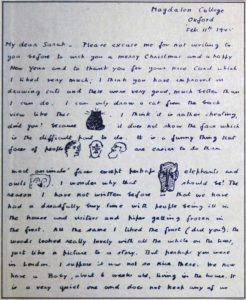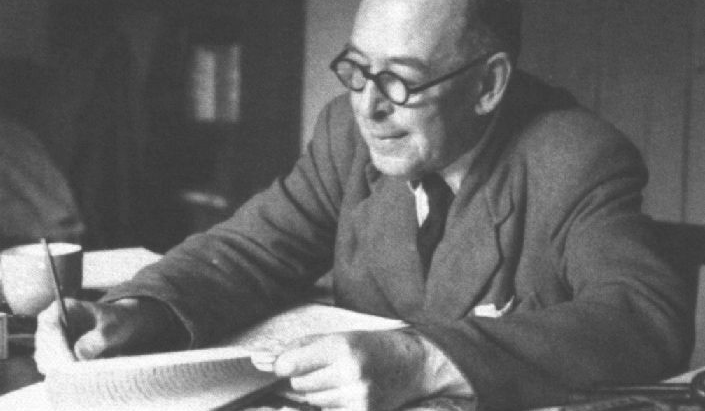There are so many reasons to recommend, C.S. Lewis: Letters to Children, a book both my (then) 8 year old daughter and I enjoyed immensely. Here are a few, in no particular order.
1. In all the letters, he treats the children he is writing to with great dignity and respect. This will not surprise readers of the Narnia books, but it is wonderful to read. If you know much about Lewis’ life, he was in many ways a perfect candidate to be curmudgeonly and rude (as Tolkien could be), or dismissive of children. He was not. He was very, very kind and did not “talk down” to his correspondents. This is the case throughout the letters.
2. Many people erroneously call the Narnia stories allegories. He describes what they actually are to one young girl. They are “Supposal Stories.”
“You are mistaken when you think that everything in the book ‘represents’ something in the world. Things do that in The Pilgrim’s Progress but I’m not writing in that way. I did not say to myself, ‘Let us represent Jesus as He really is in our world by a Lion in Narnia’: I said ‘Let us suppose that there were a land like Narnia and that the Son of God, as He became a man in our world, became a Lion there, and then imagine what would happen.’ If you think about it, you will see that it is quite a different thing.”
3. In another letter, he does ask a child to try to guess what other name Aslan has, hinting that “he arrived the same time as Father Christmas.”
4. He writes to agree with a child who believes the Narnia books should be read in chronological order. (Something I don’t agree with, for what it’s worth.)
5. He shows tremendous compassion for a child suffering through intense spiritual confusion. He is gentle and empathetic. (The child is deeply troubled about loving Aslan more than Jesus.)
6. If you have read some biographies of Lewis, you know he had extensive domestic duties. His own brother referred to him as “a slave” to Mrs. Moore. In these letters you get a hint of what that was like.
“For most men Saturday afternoon is a free time, but I have an invalid old lady to look after and the week-end is the time when I have no freedom at all, and have to try to be Nurse, Kennel-Maid, Wood-cutter, Butler, House-maid and Secretary all in one. I had hoped that if the old lady were a little better than usual and if all the other people in the house were in good tempers I might be able to get away next Saturday. But the old lady is a good deal worse than usual and most of the people in house are in bad tempers. So I must ‘stick to the ship.’”
I often wonder what he could have accomplished with a less burdensome home life, but it was not to be. When he was free of Mrs. Moore, he had an alcoholic brother to care for, not to mention marrying a woman who was gravely ill for nearly all their married life. It does put one’s grumbling about “time to write” in some perspective.
7. There is a painful undertone to an appropriately gentle letter where he speaks of an unhappy Easter with Joy (his wife).
“Well, I can’t say I have had a very happy Easter, for I have lately got married and my wife is very, very ill. I am sure Aslan knows best and whether He leaves her with me or takes her to His own country, he will do what is right. But of course it makes me very sad. I am sure you and your mother will pray for us.”
8. While eschewing the particularities of those we would now call “Grammar Nazis,” he offers some wonderful writing advice in one letter, including:
“Always prefer the plain direct word to the long, vague one. Don’t implement promises, but keep them.”
Don’t eschew the particularities?
9. There’s a delightful letter where he describes a rabbit of his acquaintance, one “Baron Biscuit,” about whom he wrote the following short poem:
“A funny old man had a habit
of giving a leaf to a rabbit.
At first it was shy
But then, by and by,
It got rude and would stand up to grab it.”
10. One of the most striking things is how some of the letters end. He is very tender and humble, turning the tables on the Fan and Great Man dynamic which would be so easy to play out. Instead, he often asks the child to pray for him.
“Best love to you all. When you say your prayers sometimes ask God to bless me.
Yours ever, C.S. Lewis”
- Make Believe Makes Believers - July 19, 2021
- The Archer’s Cup is Here - September 30, 2020
- It Is What It Is, But It Is Not What It Shall Be - March 30, 2020

Good notes of some particulaity.
Perhaps you may now see from whence comes your gift for spelling.
We are currently reading aloud the YWAM Christian Heros biography of C.S. Lewis and my boys just love him. They were chatting last night about conversations they hope to have with him in heaven. 🙂 His work and life are truly inspirational. I must add this book to our reading list!
Good old Clive.
#5 has long been one of my favorites. I love that he asks L. to pray that “if Mr. Lewis has worried any other children by his books or done them any harm, then please forgive him and help him never to do it again.” It’s a sound prayer to echo as a writer for any age group, I think. Thank you for this wonderful post!
Oh, these sound lovely! Did you get some inspiration for your own letter writing? 🙂
A little while ago, I read about a letter C S Lewis had written to an 8 year old girl which explained the Narnia books and how they relate to Jesus and Christianity. I understand a plaque was made of the letter and it was erected in a place to honour C S Lewis. I cannot remember where I read it and where the plaque of the letter is placed. Can anyone tell me where in the world it is as it might be possible for me to visit it.